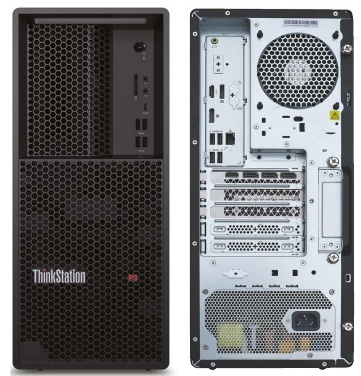Lenovo ThinkStation P3 Tower review
This article first appeared in Issue 361 of PC Pro.
Lenovo, as the heir to IBM’s PC business, has a long and illustrious history of producing among the best workstation designs. The P3 Tower is the latest in the line of mid-sized tower systems, with a solid construction and labour-saving features.
However, the version we were sent came with a 13th generation Intel Core i9 processor, one behind other Intel-based systems this month, even though this system can be specified with the 14th generation. At least it’s a near range-topping 13900K, which has eight performance P-cores with Hyper-Threading and 16 efficiency E-cores without it. The P-cores have a base 3GHz clock and top Thermal Velocity Boost of 5.8GHz. The E-cores have a base 2.2GHz frequency with 4.3GHz boost. There is a KS version that’s a little faster still, but there’s not a huge amount in it – and Lenovo only supplies this workstation with vPro chips anyway.
Lenovo has backed the Intel CPU with 64GB of 4,400MHz DDR5 RAM, supplied as two modules. This leaves two DIMM slots free to upgrade to the 128GB maximum. The Lenovo P3 chassis has some well-thought-out design elements, such as the two 120mm fans extracting air directly from the graphics card, and the side caddy for a 3.5in drive. Lenovo has also chosen the 1,100W PSU option for this system, which is sensible considering the graphics card.
Our sample P3 was equipped with an Nvidia GeForce RTX 4080 card, a hefty three-slot GPU drawing up to 450W on its own. However, this is a German model, while the UK configurator for the P3 only offers Nvidia RTX professional options. The price above assumes you opt for an RTX A4000 in the configurator, but an RTX A4500 would add £650 inc VAT to the price.

Lenovo has included two 1TB storage devices rather than a single 2TB unit. Both drives are catchily named SK Hynix HFS001TEJ9X102N M.2 NVMe SSDs running at PCI Express 4 speeds. They deliver a quick sustainable reading rate of 7,158MB/sec, though in this month’s company it’s one of the slowest SSDs. Writing rates were 6,532MB/sec for one drive and 6,784MB/sec for the other, which are fast, but most SSDs are faster in this test.
Despite the 13th generation Intel Core i9, the Lenovo is far from a slow system. The overall score of 683 in the PC Pro media benchmarks is good compared to systems we’ve tested in the past, but the slowest this month. The image-editing score of 281 is better than the PCSpecialist Zircon, but 605 in video editing and 869 in multitasking are the lowest on test. The multicore Maxon Cinebench 2024 result of 1,719 is also behind every other workstation, as is the Blender Gooseberry frame time of 392 seconds. CPUs have clearly moved on since Intel’s last iteration. But you can buy this workstation with the latest from Intel if you need better CPU performance – and it will cost a mere £10 extra.
The consumer-grade graphics card, as usual, has strengths and weaknesses. Game designers and 3D animators will get smooth frame rates, as evidenced by SPECviewperf 2020 results of 260 in the 3ds Max viewset and 691 in Maya. Some CAD, product design and engineering applications will also run smoothly. The Catia score of 133 is decent, 632 in the SolidWorks viewset is brilliant, but 149 in Creo is a little below par. The biggest problem is 43 in the Siemens NX viewset; you’ll see far superior results if you buy this a card from Nvidia’s professional RTX range instead. But the GPU has a lot of brute power, delivering a very healthy AI inference score of 27,706 in Geekbench ML, 24,394 in the LuxMark 3.1 OpenCL render, and the Blender Gooseberry frame took only 81 seconds to output using CUDA.
The Lenovo ThinkStation P3 Tower was never going to win any performance benchmarks this month with its previous-generation CPU and consumer graphics. However, Lenovo also hasn’t used anywhere near the £4,500 inc VAT budget, with this system nearly £1,200 below that figure – and that even includes a keyboard and mouse. You could upgrade to the latest Intel CPU and RTX A4500 graphics and still have plenty of change. With the dependable Lenovo chassis design, this is a fine workstation that’s well worth considering.
0 comments:
Post a Comment